'It doesn't feel like a toilet' - public loos turned into trendy spaces
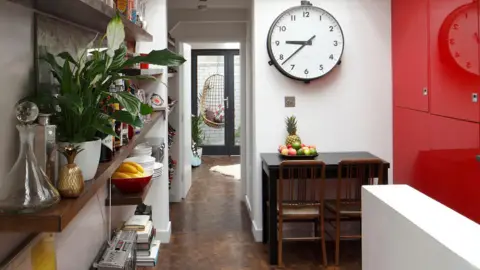 James Balston
James BalstonOf all the bizarre items up for sale on Facebook marketplace, a "townhouse" with a price of £70,000 stands out as a particularly unusual listing - not least because the property is an old public toilet.
A creative with a vision might see a bright future for the derelict Sheffield loo, similar to others which have become living spaces, galleries and breweries.
Laura Jane Clark, an architect from London, turned an initially "disgusting" abandoned underground restroom in Crystal Palace in London into a home.
"My first though was an art gallery or bar, but then I realised actually, we could live under here," she said.
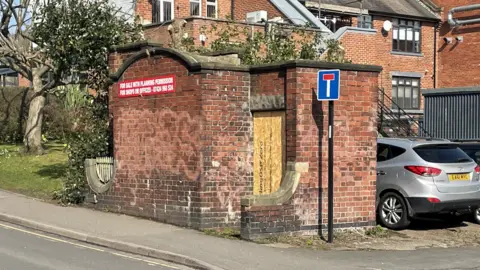 Simon Thake/BBC
Simon Thake/BBC"Having persuaded the council to sell them to me for a business, I had to go back and ask to live in them – I think they were just trying to get rid of me, and they said yes."
Ms Clark, who now lives in Glasgow, went through almost seven years of back-and-forth with the council, determined to stop the loos from being filled in with concrete.
"Luckily people saw my vision and saw the potential," she said.
"It was quite an undertaking. I was there from dusk every day working as a labourer, taking skips of concrete up to the pavement.
"People were really curious as they had been shut for so many years."
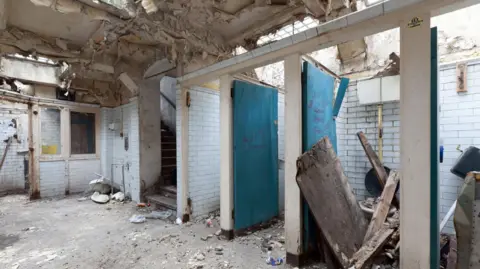 Fiona Murray
Fiona MurrayDespite public toilets first opening in the 1800s in the UK, two centuries on, access to the facilities has declined, and put people off from visiting certain towns in the process.
Cash-strapped councils have been selling or transferring their management to try and save money, with some putting measures in place to ensure future owners still provide public access to the facilities.
Janet Martin, like Ms Clark, renovated a toilet block that had been derelict for many years and was no longer in public use.
"It was about to be bulldozed and there was no recognition of it as an architecturally significant building. I do believe we need public toilets," she said.
The 70-year-old former nurse opened the Phyllis Maud Performance Space, a 35-seat venue, five years ago in honour of her late aunt.
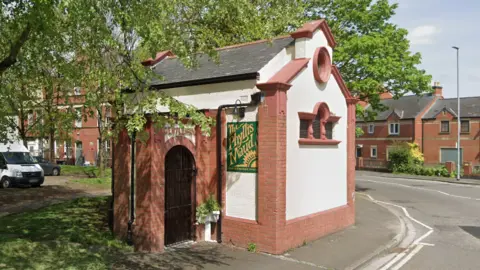 Google
GoogleMs Martin, who also owns Barnabas Arts House in Newport, Wales, said: "She didn't want a plot, but I thought she couldn't go out and nothing be left, so I decided to name it after her.
"Now her name is on the lips of lots of people all over. I don't know what she'd think about that."
She purchased the building for £15,000 and spent £55,000 renovating it after being drawn to how "freakishly pretty" it was.
"It is quite overdesigned as Edwardian toilets were, and I always thought, what a cute building," she said.
"It doesn't feel like you're in a toilet. It feels like you are in the theatre."
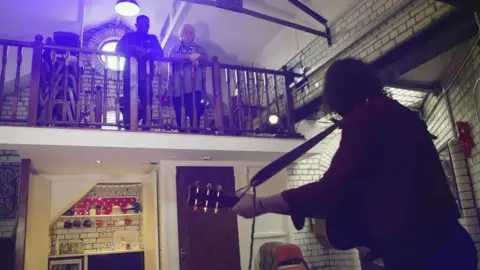
The listed status of the building meant the white tiling had to be kept, which she said she would have done anyway.
Public toilet conversions, while increasingly trendy and a unique draw to bars, restaurants and performance venues, are not a new phenomenon.
One of the first venues to join the trend was a sandwich bar which appeared in central London over a decade ago.
Music venues, theatres, wine bars and offices soon followed.
Amjid Hafiz owns Latte Caffe on Abbeydale Road in Sheffield, which has served as a newsagents and sweet shop since it was first built as a toilet.
He said: "When it was a shop, I used to come in here and think, 'I could do something with this. I could do something here.'"
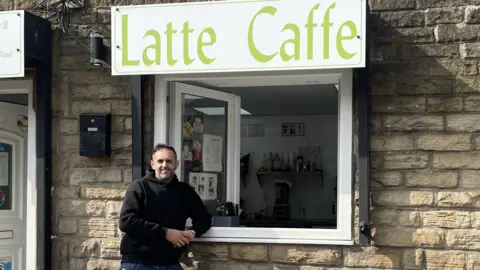 Simon Thake/BBC
Simon Thake/BBCHe said the building's history is a "positive thing", and even as a small space, has the potential to provide jobs and become something lucrative.
As for the £70,000 "townhouse" up for sale on Archer Road, less than a mile from Latte Caffe, its future is unwritten.
Ms Clark, star of Your Home Made Perfect on BBC2, said: "Renovations need to be done carefully.
"The last thing you want is a developer going 'turn it into a townhouse' and then it being badly done, but they can work really well or as cafés, bars and hairdressers too.
"Any regeneration is good regeneration."
Listen to highlights from South Yorkshire on BBC Sounds, catch up with the latest episode of Look North
